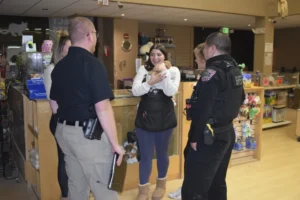Is the Outside of Your Car Fair Game for Canine Cops? High Court Says Yes
Wyoming Supreme Court rules drug-detecting dogs can sniff vehicles’ exteriors without probable cause
- Published In: Criminal Justice
- Last Updated: Jun 10, 2023

Wyoming Supreme Court Chief Justice Kate M. Fox wrote an opinion that upholds a district court’s decision to deny the separate motions to suppress evidence by two defendants charged with multiple drug-related counts, Maria Anne Joseph and Jackson Elliot Tarzia. The opinion, released Wednesday, argues that exterior sniffs of vehicles by canines is not unconstitutional. (Courtesy photo from the Wyoming Judicial Branch’s website)
By Shen Wu Tan
Special to the Wyoming Truth
The Wyoming Supreme Court this week ruled that dogs trained to detect drugs can sniff a vehicle’s exterior without probable cause.
The opinion by Chief Justice Kate M. Fox, released Wednesday, upholds a district court’s decision to deny the separate motions to suppress evidence by two defendants charged with multiple drug-related counts. Maria Anne Joseph and Jackson Elliot Tarzia argued that the canine sniffs of their vehicles’ exteriors took place without probable cause, and therefore, violated the Wyoming Constitution.
“A dog sniff of the exterior of a vehicle is not a search under the Fourth Amendment,” the opinion states, citing a 2020 Wyoming court case. The Fourth Amendment protects against unreasonable searches and seizures by the government.
“The United States Supreme Court has reasoned that a canine sniff of a vehicle’s exterior does not implicate legitimate privacy concerns because it is minimally intrusive and can reveal only the presence of contraband, an item in which an individual cannot claim a privacy interest,” the opinion reads. “Additionally, we have recognized that an individual has no legitimate expectation of privacy in the airspace outside a vehicle.”
Joseph was charged with five felonies related to controlled substances on Oct. 11, 2021 after law enforcement officials found four large suitcases filled with vacuum-sealed packages of raw marijuana in her car. She was pulled over by a state trooper who was patrolling Interstate 80 in Carbon County and noticed that her vehicle crossed the highway centerline multiple times. During their encounter, the state trooper observed luggage covered with a blanket in the back of her vehicle, according to the Wyoming Supreme Court opinion.
The trooper also reportedly noticed that Joseph was “very talkative” and “very nervous” and decided to call for a canine a few minutes later. A canine from the Carbon County Sheriff’s Office, trained to detect drugs, alerted officers to the back of Joseph’s vehicle and to the four large suitcases containing marijuana. After Joseph’s arrest, a more thorough search of the car revealed about 25 pounds of tetrahydrocannabinol (THC) wax, two pounds of psilocybin mushrooms and 58 pounds of raw, plant-form marijuana.
Joseph filed a motion to suppress the evidence discovered in her car, but the district court denied it. The defendant then entered a conditional plea of guilty to a single three-count of possession of marijuana with intent to deliver, which preserved her ability to appeal the denial. The lower court accepted the plea and sentenced Joseph to three to five years in prison, suspended in favor of three years of probation. Afterward, she appealed to the Wyoming Supreme Court.
‘No state precedent’
The other defendant, Tarzia, was charged with felony possession of marijuana and felony possession of marijuana with intent to deliver on Aug. 4, 2021. A state trooper, who was assigned to a canine criminal interdiction detail in the Laramie area, pulled into a truck stop in Albany County and observed Tarzia’s rental car parked at a fuel pump. Since the rental car, a white 2021 Yukon Denali, was uncommon, the trooper considered it to be a “vehicle of interest,” the opinion reads.
The trooper parked close to the rental vehicle and began talking with Kevin Curtis, one of the car’s occupants, who was pumping gas. A few minutes into their conversation, Tarzia returned to the vehicle. While Curtis appeared relaxed and conversational, the trooper described Tarzia as “rigid and standoffish.” The trooper also picked up on inconsistencies and oddities in their described travel plans and business activities, which roused his suspicion. The officer called for backup, and a canine alerted law enforcement to the right rear wheel well and door area. A search of the vehicle uncovered 149 vacuum-sealed bags of marijuana in duffel bags, weighing about 150 pounds.
Tarzia filed a motion to suppress evidence recovered from his vehicle, similarly arguing that the canine’s sniff of the car’s exterior was unconstitutional. The district court denied the motion, and the defendant entered a conditional plea of guilty to a single count of possession of marijuana. As part of the plea, the court sentenced Tarzia to three to five years in prison, suspended in favor of two years of probation. Tarzia then filed an appeal to the Wyoming Supreme Court.
“Because a dog sniff of a vehicle’s exterior is not a search under the Fourth Amendment, it ‘does not have to be justified by probable cause or even by reasonable suspicion,’” the opinion states regarding the decision to uphold the lower court’s ruling. “Appellants do not dispute this Fourth Amendment precedent but contend that because Article 1, Section 4 of the Wyoming Constitution is more protective than the Fourth Amendment, it should be interpreted to require probable cause to support a canine sniff of a vehicle’s exterior.”
According to the opinion, the appellants argued that the Wyoming Supreme Court has required the state to offer a reason to search the inside of a car other than a defendant being placed under arrest.
“Certainly, our Court has been more protective of the privacy of a vehicle’s interior than the United States Supreme Court,” the opinion states. “The question here, however, concerns the privacy interest in the public airspace outside a vehicle, and Appellants point to no state precedent recognizing such a privacy interest, particularly considering the minimally intrusive nature of an exterior canine sniff.”













